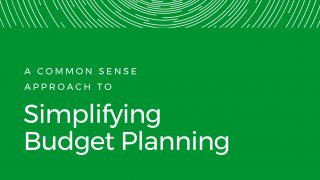- October 4, 2021
- CINC Systems

It’s officially that time of year again! Budget season has arrived, and you’re probably getting on your boards right now about their budgets. But they aren’t the only ones who should be planning out next year’s expenses–you should be, too! If you haven’t started considering your own budgeting needs, consider this your own reminder: it’s time to get started on your management company’s annual budget.
Budgeting Built for You
Working with community associations, you know that your clients are all special and unique in their own ways, and you’ve probably spent a good deal of time making sure they know that. Because that’s how they look after their needs best–understanding what those needs are and how specific they are to each and every community. But as a management company, you’re not in the same boat. You cater to uniqueness, but your business model is not all that different from other businesses out there today. So planning your budget is going to be a little simpler in that regard.
Start with the Basics
Budgeting isn’t quite an exact science, but it does have some pretty standard processes. For example, taking a look at your previous year’s revenue is often the first step to creating a business budget, and one you’ll have in common with your boards. Examining how much your company made from incoming payments and comparing that number to last year’s projection will be very telling. It will show how well you followed your own expectations, and where adjustments need to be made in the coming year’s planning.
Take a Deeper Look
Budgeting is more than just the money coming in, though. It’s the projection of potential expenses you’ll be making and how they impact your company in the long run. You should be taking a serious look at how much you’re paying versus how much you’re getting from things like service providers, software solutions, and your marketing efforts (which you’re paying for, even if you don’t think so). Keep in mind that these expenses are all areas where the money you’re spending should be saving you at least as much in what would have been time spent on those tasks.
Questions Your Budget Should Be Answering
Your budget isn’t just a guide to survive the next year–it should be your map to success, to seeing your business thrive. With that in mind, there are a few big questions your budgeting process should be answering:
Where Can I Afford to Grow, and Where Should I Cut Back?
This is a multi-step process if you really think about it. One of those steps is assessing the value of your service providers and their own price changes could have a moderate impact on your expectations in the coming year. Looking to those numbers and determining the value being provided is where you will start to see where cutbacks can be made if needed. Taking a look at your staff and the work burdening your teams is where you’ll be able to determine how much growth you can and should be considering as well.
Can I Afford to Upgrade My Software?
Similarly, you should be assessing the cost of your current software partner. And more often than not, this question will actually be, “can I afford NOT to upgrade?” Because even if that cost says $0 spent on your expense line, unless your software is built for a community or property management company, you’re likely wasting money via time spent on daily, weekly, and monthly management and accounting tasks. This is an area where budget management can get a little tricky, because the way to save the most money could actually be spending more than whatever you’re currently paying out. Start by assessing the time your team is spending on repetitive or time-consuming tasks, and consider which of those tasks could be automated by an industry-specific platform. Pricing out how much time you’ll save as dollars (dollars spent on the employees handling the tasks, dollars spent on additional softwares needed to better complete the tasks, etc) is a good way to determine if you should be considering a software switch.
Should I Raise My Prices?
Bumping up the price of your services is a daunting concept. You want to be adequately compensated for all of the hard work you put in, but you know that your clients are working on a tight budget. Community association management isn’t exactly the most lucrative field out there. Your management company probably feels similar stress when your partners or vendors raise their prices. But in business, this is an imperative step in growth and continued success. Cost of living alone needs to be a consideration every single year, as should any additions being made to your suite of service provisions. Price increases are a given, and as long as they are kept reasonable and predictable, are not necessarily deal-breakers for clients.
Get To It!
It’s already October, which means you’re already riding your boards about their own budgets. So consider us your very friendly, yet still very firm reminder that your budget needs attention, too! This list is just the tip of the iceberg, so don’t put it off any longer. Get your shareholders together this week to start the conversation about your 2022 budget, and if you need assistance in determining your software decisions for the upcoming year, take a peek at our ultimate buyer’s guide to association management software.
Related Reads

Blog
Keeping Calm and Carrying On: Leadership Tips for Turbulent Times
- November 20, 2024

Blog
AI at Bat: What Umpires, Baseball, and Data Security Can Teach Us About AI Risks
- October 28, 2024

Blog
Do I really need a homeowner app when I have a mobile-friendly website?
- October 14, 2024

Blog
Weathering the Storm: How to Adapt to Soaring HOA Insurance Costs
- October 1, 2024

Blog
How Today’s Generative AI Investment Drives Long-Term CAM Success: A Timeline
- September 16, 2024

Blog
A Common Sense Approach to Simplifying Budget Planning Get ready to conquer HOA budget season with this effective strategy
- September 2, 2024
